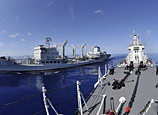
From September, the post now occupied by Pascal Lamy as the Director-General of the World Trade Organization (WTO) will be taken over by a Brazilian, Roberto Carvalho de Azevêdo. This passing of the reins marks another win for the BRICS bloc and offers further evidence that the world's balance of power is shifting towards countries that once held little influence on the global stage. And as these countries become more empowered within important organizations, a sea change is afoot which will create major opportunities for mutual economic benefit.
The news mentioned above comes at a time when the world economy is changing rapidly and many European countries have their hands full coping with local and regional economic challenges. As a result, many top positions within prominent world organizations are going toward experts from developing countries.
Yet, some are skeptical and say that the WTO is no longer an important organization. However, it is undeniable that BRICS countries will benefit from having a strong influence within an organization composed of 159 members and 25 observing countries.
China undoubtedly has great interest in the WTO, having joined the organization in December 2001 after about 15 years of preparation and negotiations. Brazil has been a member since its creation in 1995, just as long as BRICS counterparts India and South Africa - Russia came aboard in 2012.
The influence of this group may grow even stronger if Brazil and China can unite their political and economic forces.
Actually, as a token of appreciation for China's support of Brazil, Azevêdo is likely to nominate a Chinese diplomat for one of the top four seats at the head of the WTO. If BRICS nations can align their interests as the organization's center of gravity shifts away from the West, we can expect to hear a louder voice from these countries which have long gone unheard.
To support unified development, stronger and more effective political engagement is necessary. We have already seen developments along these lines within the business sector, where dialogues are now closer and agreements are quickly reached. Chinese companies are now entering the Brazilian and other BRICS markets like never before, establishing sales channels, partnerships and manufacturing facilities, which will help create new jobs and heat up local economies.
With the help of the WTO, and the example that is being set now by Brazil, there are still more doors that can be opened.
The creation of the BRICS Bank also illustrates how politics can help developing nations widen their sphere of influence.
Certainly, more power means more responsibility, but being in the limelight can result in directed progress if responsibilities are managed wisely. Developing countries are definitely learning how mutual aid and support can help them either blaze their own paths or climb the ranks within well-established institutions. Over the long run, this will translate into gains for each and every country.
The author is an engineer and business consultant.
















 White-collar workers setting up stalls become popular
White-collar workers setting up stalls become popular


![]()
